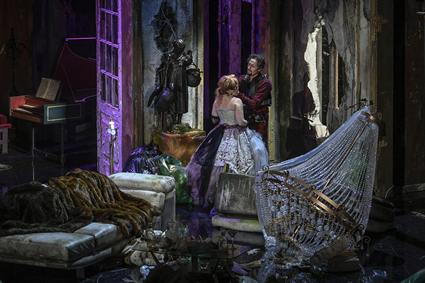| Opera Reviews | 27 April 2024 |
Rodrigo debuts in Göttingenby Catriona Graham |
|
Handel: Rodrigo
|
|

Fflur Wyn (Esilena), Erica Eloff (Rodrigo)
|
|
|
Rodrigo, the last of the Handel operas to be produced before the Göttingen International Handel Festival celebrates its centenary in 2020, is also his first Italian opera. In the dying days of Visigothic Spain, Rodrigo is married to childless Esilena, but has a child by Florinda, sister of Giuliano, who has been sent by Rodrigo to conquer Aragon, whose king, Evanco, he has brought back in chains. Oh, and there is Fernando, a sort of factotum to Rodrigo. The set underlines the air of decadence. Despite the high gloss floor, sofas covered with fake fur throws and fancy chandeliers, there are too many bottles on the tables, and someone has forgotten to put out the rubbish. Rodrigo’s and Florinda’s affair is enacted during the overture, with Anna Dennis in a tarty blonde wig. In the background, someone is playing a harpsichord along with the orchestra. A Rhodesian ridgeback trots onstage and rewards Rodrigo with paws in return for treats. But Rodrigo is leaving Florinda and, vowing revenge, she pulls off the blond wig, releasing long brown tresses. The ornamentation in her aria "Pugneran con noi le stelle" is gorgeous. Meanwhile, Esilena, in rather Moorish hippy chic, pushes on a shopping trolley of herbs, with hospital drip. She pours out her heart to safari-suited Fernando, as he picks up rubbish round the room, then powers the lights by riding a static bike. Next to arrive is Giuliano with Evanco, his wrists gaffer-taped, and a freezer box containing a polythene-bagged severed head. And so the revenge plot is set. Florinda and her brother team up with Evanco to rebel against Rodrigo, who is remarkably unfazed, playing keepy-uppy with a toy rabbit on a racquet. When the three successfully attack the house, Giuliano live-streams his address to the army. Evanco’s declaration of love for Florinda is very sensuously sung by Russell Harcourt. Now Esilena arrives to tell Florinda she can have Rodrigo, in exchange for peace but Florinda only wants Rodrigo’s heart on a plate. As Esilena leaves, Florinda starts cutting her hair with secateurs. As the curtain falls on the first half, she is taking aim at a chandelier. Esilena now extracts a confection of a dress, which clearly holds memories for them and Rodrigo admits that he loves her. When the rebels return, Evanco looks like a punk Davey Crocket with his skunk face-paint. And, to our horror, the corpse of the dog is flung onstage. Even worse, Giuliano lies down and embraces it. Rodrigo is now cornered but Esilena has Florinda’s baby and uses it as a human shield to negotiate for her husband’s life. Eventually, all is resolved with Rodrigo renouncing the throne. Esilena’s shopping trolley is now a barbie and, to our further horror, that’s where the dog ends. Meanwhile, Fernando, who died earlier, is at the harpsichord in the back room again. Fflur Wyn’s Esilena is the moral heart of the piece, albeit compromised by the child as human shield, and her singing reflects this sincerity. Jorge Navarro-Colorado is a dashing, sharp-suited Giuliano and sings beautifully. His switch from loyal lieutenant to rebel is as convincing as his punch through the prison wall to release Evanco. Leandro Marziotte’s Fernando is a slightly amused and detached observer of the goings-on. In a masterpiece of casting, however, Erica Erloff is a splendid Rodrigo. Taller than all but Navarro-Colorado, and with the slightest beginnings of a paunch, courtesy of designer Dorota Karolczak, she is totally male, turning into a tracksuited couch-potato by the final curtain. And her singing is excellent too. Director Walter Sutcliffe has created an ambiguous onstage world, which can be interpreted a number of ways. There is no such ambiguity in the pit, where the FestspielOrchester Göttingen, conducted by Laurence Cummings, turns in another sublime performance, with particular mentions to Elizabeth Blumenstock on violin and Susanne Regel on oboe. This is a production that can be seen again, to notice elements of the rich staging missed the first time. Only, I’m not so sure that the rather ‘I’m a Celebrity, Get Me Out of Here’ ending is quite what the librettist meant by "vincer se stesso è la maggior vittoria" – to master oneself is the greatest victory.
|
|
| Text © Catriona Graham Photo © Alciro Theodoro da Silva |
|







